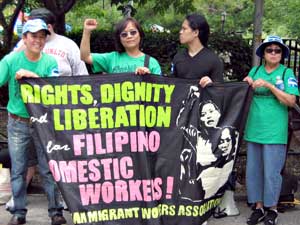Domestic workers demand: 'Down with exploitation!'
By
Anne Pruden
New York
Published Jun 18, 2007 5:48 AM
A vivacious multinational rally of several hundred people gathered June 9 at a
New York University campus park to protest the racist oppression of domestic
workers who led this action on a rare day off from housekeeping, childcare and
elderly care jobs.
|
June 9 protest.
WW photo: Anne Pruden
|
They work without benefit of a living wage, medical care, overtime or sick time
and many suffer abuse from prejudiced bosses. Under the call “We Built
This City,” domestic workers formed “DWU”—Domestic
Workers United—to fight for basic labor rights, as well as respect,
recognition and reparations.
DWU members—mostly women from the Caribbean, South America, Asia and
Africa—loudly chanted their demands, adding a variety of displays of
cultures. These members represented Unity Housecleaners, Kalayaan/Women Workers
Project of CAAAV, Andolan Organizing South Asian Workers, Damayan Migrant
Workers Assoc. and Haitian Women for Haitian Refugees.
As they marched to City Hall, these demands attracted much attention from
shoppers who heard cries of “Free domestic workers! Down with slavery!
Down with exploitation! Down with racism! Down with sexism! Up with the
workers! Up with immigrant rights!”
Many blocks later, from a sidewalk beside City Hall, several domestic workers
testified about how difficult and dangerous their work can be. They demanded
passage of the Domestic Workers Bill of Rights (A628B, S5325).
As in their chants, speakers connected their plight to that of slaves. So the
next stop in this long working-class march was to the African Burial Ground.
After an emotional request by DWU leaders for a moment of silence at this
burial ground, a speaker from the Transit Workers Union, who also represented
the Coalition of Black Trade Unionists, followed.
Haitian musicians performed there soon after, and speakers in several languages
addressed the marchers.
For the next and ending march to a park near the government’s immigration
offices, demonstrators connected to a long chain to show the likeness to
slavery that domestic workers face daily. Finally, the chain was thrown to the
ground by all and the DWU led an inspirational song about their struggle ending
in victory.
The DWU action was sponsored by the New York Domestic Workers Justice
Coalition, New York Jobs With Justice and Jews for Racial and Economic Justice.
Articles copyright 1995-2012 Workers World.
Verbatim copying and distribution of this entire article is permitted in any medium without royalty provided this notice is preserved.
Workers World, 55 W. 17 St., NY, NY 10011
Email:
[email protected]
Subscribe
[email protected]
Support independent news
DONATE


